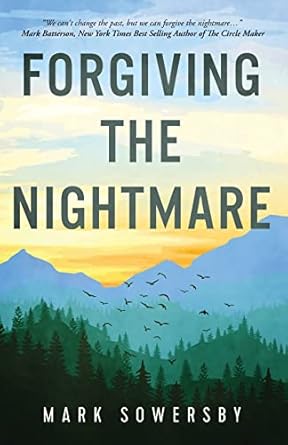Well, it started back in 1984. I was only 11 years old when my dad relocated his whole family to Colorado Springs, Colorado, to attend Bible college. The first year went okay. But when we moved right into town, to Colorado Springs, that’s when it started going downhill. I’m the youngest of three, and my oldest brother, Brian, had muscular dystrophy, so he couldn’t take care of himself. And my next-oldest brother, Pat, got involved in drugs, alcohol, and all kinds of stuff. So, at a young age, I had to take care of my oldest brother while my parents were away at Bible college. And my other brother was never home, so I was 11 years old, having to help my oldest brother use the bathroom, get him any food he needed, and just about anything. And there were times my other brother would come home so high that he couldn’t even take care of himself. He basically would stumble down the stairs and go to sleep. It was tough. And I felt the pressure at a young age to take care of my oldest brother because no one else did during the day. For years, I felt bitterness and resentment towards my mom, dad, and brothers. There were times even when my dad had to defend himself during fistfights between my brother Pat and him. One night, they ended up in my bedroom. My dad was holding my brother down, saying, “I love you.” And my brother would say, “I hate you.” So here I was at 10, 11, and 12, and all this was going on at home, and it was so hard at such a young age. Additionally, a doctor diagnosed me with an overactive thyroid. My heart was beating 175 times a minute when they discovered it, and at 12 years old, they told me that I might have thyroid cancer on top of everything else going on, but I thank God I didn’t have cancer, and the doctors could bring it under control with medication. My dad graduated from Bible college in 1987 or 1988, and we moved to Maine, where he got his first church. To me, this was the happiest time of my life because my brother Pat stayed in Colorado. I was glad to get away from him, so it was just me, my older brother, my mom, and my dad in Maine. The pressure was immense, but it was better, and I would take care of my oldest brother all over again if I could.
What kind of things did you do during that hard time to try to cope? Did you use healthy coping mechanisms? How did you do that at that young age?
I would go away and escape by going to my bedroom a lot and playing with my toys. My bedroom was my sanctuary. I would go in there and shut the door, and sometimes I would cry. I said, “God, please end this. I don’t want to be here anymore.” And, I thought about ending my life at a young age, but I didn’t dare to go through with it, thank God. You mentioned that a puppy played a surprising role in saving your life during that season of deep depression. Can you share more about that moment and how God used something so simple to bring hope?Yes. In 1989, my brother Brian, the one who had muscular dystrophy, passed away. So I was around 15 and I was in deep depression because there were times that I wasn’t nice to my brother Brian, which was wrong of me. I would look back on the past and feel sad that I didn’t do more for him, and I felt so awful when he passed that I wanted to end my life. The very day I was going to take my life, I got home from school, and there was this little puppy dog named Mason there. I ran down the hall and I said, “Mom, is this our dog?” And she said, “It’s your dog.” So I thought to myself, I have to take care of this animal now, and I couldn’t end my life. I think my mom knew how much I was struggling. The dog helped save my life, and we saved Mason’s life too because his former owner abused him. It was the owner’s wife who called my mom to ask her if she wanted a puppy. And she said, “Yes.” We saved each other’s lives.
At one point, you had one foot in the world and one foot trying to follow Christ. How did you get to the point where you stayed solid in your walk with Jesus and completely surrendered and never looked back?
I was flip-flopping back and forth, basically from when I graduated from high school in ‘92, for about five years. I would go to church on Sundays and then live like the rest of the world, drinking and doing some drugs. Thankfully, I didn’t get into the hard stuff because, even though I wasn’t a Christian, I knew I didn’t want to live like I was. In 1998, my dad scheduled a revival week at the church. Believe it or not, it was the same week as my birthday, and on August 13th, 1998, we had extraordinary ministers come in to share. I don’t remember the preacher’s name. I wish I did, but he preached a powerful service, and the message was about counting the cost from Luke 14. And it made me think, “Am I willing to follow Christ?” And that day, I made my first confession. I repented of my sins and began my journey with Christ, and it happened to be on my birthday. I experienced two births on my birthday. I was born and reborn. In Luke 14:26-27, it says that you must hate mother, father, brother, sister, and daughter, and even be willing to give up your own life. So that means you put Christ first. You count the cost and deny yourself. You take up your cross and follow him. Whatever that cross is, my cross was my childhood and what I went through, because I believe God can turn your mess into a message where you can help other people. And whatever that cross is, sometimes you have to embrace it because if I didn’t go through what I went through, I wouldn’t be the person I am today.
What encouragement or practical steps would you offer to someone who wants to live boldly for Jesus, but they’re still feeling stuck? Can you give some advice or encouragement?
Seeking guidance and help is number one. Especially over the past 5-10 years, I’ve been mentoring people and talking with them and saying, “Hey, if you need anything, give me a call.” Be a friend and an ally for them. If you’re fighting an addiction, go to someone you trust, like a friend, and say, “I need help.” And there are also recovery groups, like Celebrate Recovery. I used to go there with a friend as moral support when he was struggling with an addiction. So, seek help and guidance, and if you need to see a therapist, I recommend a Christian therapist and getting into God’s word. I use the verse Romans 12:2 for The Christian Rebel, which says, “Do not conform to the patterns of this world, but be transformed by the renewing of your mind.” Then you will be able to test and prove what God’s will is.” So when you do not conform, it means you stop doing what the rest of the world’s doing and you get into God’s word and renew your mind and pray. I came up with my channel’s name from this verse because what does a rebel do? They don’t conform, so I thought, okay, there are two ways to be a rebel. You can either rebel against God and conform to this world or rebel against this world and conform to Christ. I want people not to conform to this world anymore, but to follow Christ. And I hope that through our channels, we can help people deepen their walk with Christ.
You’re teaching and encouraging others now through The Christian Rebel YouTube channel. What is one message of truth that you believe the church and especially this next generation needs?
That you do not conform. You don’t live like the world. You deny yourself, take up your cross, and follow Him. That’s the problem with this world—many people are conforming. You can search on the internet anywhere, and you can see other denominations and churches allowing sin into our churches, and they’re going along with the culture. They’re conforming to the patterns of this world, preaching false doctrines and gospels, and going along with the rest of the world. And now if the church would follow this one simple Scripture—"Do not conform"—I think it would be a whole different world because the outside world is seeing all these so-called Christians living like the world and thinking they’re a bunch of hypocrites. Now, am I perfect? No, I make mistakes. But with Christ’s help, I do my best because I want to follow Him. There’s that Scripture verse that says, “If my people, who are called by my name, will humble themselves and pray and seek my face and turn from their wicked ways…” from 2 Chronicles 7:14. If we conform to Christ and follow His ways and Scripture, we will humble ourselves and repent of our sins—revival starts right here with me and with you. If we repent first and say, “God, I need your help.” I repent of my sins, and then that’s where revival starts, with us, and then we can share our message with other people—this is what Christ did for me, and He could do the same for you.
The Christian Rebel YouTube Channel
The Christian Rebel Ministry Site
The Christian Rebel Ministry Facebook Page
Bret's story can be found on the VictoryEmbraced: Truth, Talk & Testimonies podcast platforms


.jpg)


.png)
.png)






.png)

.png)




.png)
.png)




.png)
.png)



